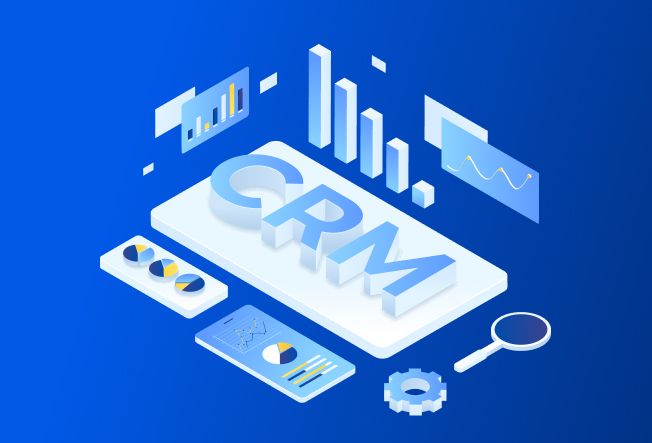How Does Dynamics 365 CRM and Sales Automation Help With Lead Management?
Jan 20, 2023 Amit Kumar Dey
According to a study from Salesforce, as of 2020, about 81% of companies in the US use a CRM platform. CRM platforms such as Dynamics 365, Salesforce, and SugarCRM are widely used by small, medium and large businesses to manage their customer relationships and improve their sales, customer service, and marketing processes. As the need for businesses to have a centralized place to manage customer interactions and data increases, it is likely that the number of organizations using CRM platforms will continue to grow.
Dynamics 365 is a customer relationship management (CRM) platform that includes specific modules for sales lead management. Dynamics 365 CRM allows businesses to manage and automate their sales, customer service, and marketing processes all in one place.
The sales lead management module in Dynamics 365 provides a set of tools to manage and track leads from initial contact to close. This includes the ability to create and manage leads, assign leads to sales representatives, track leads through the sales process, and analyze lead data to gain insights into which leads are most likely to convert.
Additionally, Dynamics 365 CRM offers the ability to automate follow-up tasks and set up targeted campaigns to nurture leads. With Dynamics 365 CRM, businesses can gain a deeper understanding of their leads, create more targeted marketing campaigns, improve sales processes, and make data-driven decisions.
Dynamics 365 CRM is a cloud-based solution that can be accessed from anywhere and can be integrated with other Microsoft tools, making it an efficient and effective solution for managing sales leads.
Let’s navigate through how lead management becomes a heck of lot easier with Dynamics 365 implementation.
Lead Capturing
Dynamics 365 helps lead capturing by-
- Marketing Automation Integration: Dynamics 365 can integrate with marketing automation tools like Pardot, Marketo, and others to capture leads from different marketing campaigns. This allows for lead information to be automatically sent to Dynamics 365 CRM, where it can be tracked and managed.
- Web Form Integration: Dynamics 365 can integrate with web form services providers like Typeform, Gravity Forms, and others, which allow for lead capture through web forms. This allows for lead information to be automatically sent to Dynamics 365 CRM, where it can be tracked and managed.
- Social Media Integration: Dynamics 365 can integrate with social listening tools like Hootsuite, Sprout Social, or Brand24, to capture leads from social media platforms like LinkedIn, Twitter, and Facebook. This allows for lead information to be automatically sent to Dynamics 365 CRM, where it can be tracked and managed.
- Email Tracking Integration: Dynamics 365 can integrate with email tracking tools like Yesware, ToutApp, or HubSpot Sales, to track leads when they open and click on emails. This allows for lead information to be automatically sent to Dynamics 365 CRM, where it can be tracked and managed.
- Website Tracking Integration: Dynamics 365 can integrate with website tracking tools like Google Analytics to track leads when they visit the website. This allows for lead information to be automatically sent to Dynamics 365 CRM, where it can be tracked and managed.
- By integrating with these third-party tools, Dynamics 365 CRM can automate the lead capture process, which helps to increase the efficiency of the sales process and improve the chances of converting leads into paying customers.
Lead Qualification (based on demographics, budget and buying funnel stage)
- Lead Scoring: Dynamics 365 can assign leads with a score based on their engagement level, such as how often they open and click on emails, visit the website, or interact with the company on social media. This helps sales teams to prioritize and focus their efforts on the most promising leads.
- Lead Qualification Processes: Dynamics 365 has pre-built lead qualification processes that can be customized to align with a company's sales process. These processes can include a series of steps or actions that must be completed before a lead is considered qualified, such as filling out a form, attending a webinar, or scheduling a demo.
- Lead Qualification Criteria: Dynamics 365 allows companies to set lead qualification criteria, such as budget, authority, need, and timeline (BANT). These criteria can be used to determine if a lead is qualified or not.
- Lead Routing: Dynamics 365 has lead routing functionality that automatically assigns leads to the appropriate sales representative based on predefined rules. This helps to ensure that leads are passed to the right person, which increases the chances of converting them into paying customers.
- Lead Qualification Reports: Dynamics 365 provides advanced reporting and analytics capabilities to track the performance of lead generation and management efforts. This can help to identify which leads are most likely to convert, and which lead sources are the most effective.
Lead Assignment (based on territory, industry and product line)
- Lead Routing: Dynamics 365 has lead routing functionality that automatically assigns leads to the appropriate sales representative based on predefined rules. This can be based on factors such as geography, industry, or lead source. This helps to ensure that leads are passed to the right person, which increases the chances of converting them into paying customers.
- Lead Assignment Rules: Dynamics 365 allows companies to set up lead assignment rules, which can include conditions such as lead score, lead source, or lead owner. This ensures that leads are assigned to the most appropriate sales representative based on their qualifications, experience, and workload.
- Lead Assignment Queues: Dynamics 365 helps create lead assignment queues, which are lists of leads that are waiting to be assigned to a sales representative. The leads can be prioritized based on the lead score, lead source, or other criteria.
- Lead Assignment Notifications: Dynamics 365 sends notifications to sales representatives when a new lead is assigned to them, which helps to ensure that leads are followed up on promptly.
- Lead Assignment Reports: Dynamics 365 provides advanced reporting and analytics capabilities that allow companies to track the performance of lead generation and management efforts. This can help to identify which leads are most likely to convert, and which lead sources are the most effective.
Lead Tracking ( based on pre-set criteria )
- Tracking Forms: In Dynamics 365 CRM, a lead tracking form typically includes fields for capturing information such as the lead's name, contact information, lead source, lead status, and notes. The form can be customized to include additional fields, such as industry, budget, or decision maker, based on a company's specific needs.
Lead tracking form can be used to capture leads from various sources such as web forms, external data sources, and social media, and all the leads captured through these forms will be tracked in the lead tracking form.
The lead tracking form is typically accessible from the "Leads" area of Dynamics 365 CRM, where sales representatives can view, update, and manage leads.
The lead tracking form can also be integrated with other Dynamics 365 CRM features, such as lead scoring, lead qualification, lead routing, and lead nurturing, to provide a comprehensive lead management workflow. - Tracking workflows: Lead tracking workflow in Dynamics 365 is a set of automated processes that help businesses manage and track leads through different stages of the sales process. The workflow allows businesses to assign tasks and activities, set reminders and alerts, and track the progress of leads through various stages, such as Qualification, Follow-up, and Close. The process is customizable and can be set up to fit the specific needs of the business. The lead tracking workflow in Dynamics 365 helps businesses to streamline their sales process, increase productivity and improve the chances of closing deals.
- Tracking reports: Lead tracking reports in Dynamics 365 are a set of pre-built or custom reports that provide insights into the performance of the lead tracking workflow. These reports allow businesses to analyze the data related to leads and make data-driven decisions. The reports are used to track metrics such as the number of leads generated, conversion rates, and the effectiveness of different lead-generation activities. The lead tracking reports in Dynamics 365 can be used to identify areas of improvement in the lead tracking process and make informed decisions about how to optimize lead generation and conversion. Additionally, these reports can be used to track key performance indicators (KPIs) such as lead-to-customer conversion rate, lead source effectiveness, and sales pipeline performance.
- Lead Status: Lead tracking status in Dynamics 365 is a way to track the progress of leads through different stages of the sales process. The status of a lead can indicate whether it is a new lead, a qualified lead, a follow-up lead, or a closed lead. The different statuses can be customized to fit the specific needs of the business. The lead tracking status in Dynamics 365 allows businesses to identify where leads are in the sales process, and which leads require further attention. This information can be used to prioritize follow-up activities, allocate resources more effectively and measure the effectiveness of the lead tracking process. Additionally, lead tracking status can be used to trigger automated workflows, alerts and notifications based on the current status of the lead, helping to streamline the lead management process.
Conversion
- Conversion forms: Dynamics 365, a customer relationship management (CRM) and enterprise resource planning (ERP) software, can help with conversion forms by providing tools to easily create and manage forms for capturing leads and customer information. These forms can be embedded on a website or used as standalone pages, and the data collected can be automatically stored in the Dynamics 365 system for use in marketing and sales automation, analysis, and reporting. Additionally, Dynamics 365 can also help with conversion forms by providing advanced analytics and lead scoring, which can help prioritize and target leads that are most likely to convert into customers.
- Workflow: Dynamics 365 can help with creating conversion workflows by providing tools to automate and streamline the process of converting leads into customers. The software's workflow engine allows you to create custom workflows that can be triggered by events such as the submission of a form or the completion of a task. These workflows can include tasks such as sending automated emails, updating fields on the lead or customer record, and assigning the lead to a specific sales representative. Additionally, Dynamics 365 can also integrate with other tools such as marketing automation software to further streamline the conversion process and provide more advanced analytics and lead scoring.
- Report: Dynamics 365 can help with creating conversion reports by providing a variety of built-in reporting and data visualization tools. These tools allow you to create custom reports that track key metrics such as lead conversion rates, sales pipeline progress, and customer acquisition costs. Additionally, Dynamics 365 has Power BI integration, which allows you to create interactive and visually appealing reports and dashboards. This integration can help you to better understand your data and make more informed decisions based on the insights provided by the reports. Dynamics 365 also has built-in analytics and lead scoring functionality, which can be used to track the performance of different marketing campaigns and identify which strategies are most effective at converting leads into customers.
- Rules: Dynamics 365 can help with creating conversion rule set up by providing the ability to create and manage business rules, which can be used to automatically update fields and statuses on lead and customer records based on specified conditions. For example, you can create a rule that automatically changes the status of a lead to "qualified" when a certain criteria is met, such as when the lead has been contacted a certain number of times. Additionally, Dynamics 365 has a lead conversion wizard that guides you through the process of converting leads into accounts and contacts. This wizard can be configured to automatically populate certain fields and statuses on the new records based on the information from the lead. You can also use Dynamics 365's workflow engine to create custom workflows that are triggered by the conversion of a lead to a customer, which can include tasks such as sending an email, updating fields, and assigning the lead to a specific sales representative.
- Conversion Approval: Dynamics 365 can help with conversion approval by providing the ability to set up approval workflows for the conversion of leads into customers. These workflows can be configured to route the lead to a specific individual or group for review and approval before the lead can be converted. For example, you can set up an approval workflow that requires a manager to approve the conversion of a lead before it can be converted into a customer. Additionally, Dynamics 365 also has built-in role-based security, which allows you to control which users have access to certain records and functions, such as the ability to convert leads. This way, you can limit the ability to convert leads to only certain users, such as managers or sales representatives, who have been designated as having the appropriate level of authority to approve conversions. You can also use Dynamics 365's business process flows which give you a guided process for converting a lead to an opportunity, account, contact and setting up the next steps based on the rules you've set up.
Scoring
Dynamics 365 can help with lead scoring by providing the ability to assign scores to leads based on certain criteria, such as demographics, behavior, and engagement.
Lead scoring is a way to prioritize leads by assigning a score to each lead based on their likelihood of becoming a customer. Dynamics 365 allows you to set up lead scoring rules, which can be used to automatically assign scores to leads based on certain criteria, such as the lead's demographics, behavior, and engagement with your company. For example, you can set up a rule that assigns a higher score to leads that have a high job title, work for a large company, or have viewed a specific page on your website.
Additionally, Dynamics 365 has built-in analytics and visualization features, which allows you to track the performance of your lead scoring rules and see how different leads are scored over time. Use Dynamics 365's machine learning capabilities, Microsoft Dynamics 365 Sales Insights, to get an even more advanced lead scoring based on historical data, patterns and trends. This way, you can identify which leads are most likely to convert into customers and prioritize them for follow-up and engagement.
Lead scoring can also be integrated with the marketing and sales automation features in Dynamics 365, to create targeted campaigns and communication strategies for leads with higher scores.
Nurturing
Dynamics 365 is a customer relationship management (CRM) platform that can help with lead nurturing by providing tools for tracking and managing leads, automating follow-up tasks, and analyzing the effectiveness of lead nurturing campaigns. Specifically, Dynamics 365 allows you to track leads through the sales funnel, set up automated email campaigns, and use analytics to measure the success of your lead nurturing efforts. It also integrates with other Microsoft tools like Outlook, Excel, and Power BI to give you a seamless workflow. With Dynamics 365, you can also segment your leads into different groups and apply different nurture campaigns. Personalize your approach to lead nurturing and increase your chances of converting leads into customers.
Lead Analytics
- Tracking and reporting: Dynamics 365 helps track leads through the sales funnel and see how they are progressing. You can also generate reports on lead activity, conversion rates, and other metrics to gain insights into the effectiveness of your lead nurturing efforts.
- Lead scoring: Dynamics 365 allows you to assign scores to leads based on certain criteria, such as demographics, behavior, and engagement. This can help you prioritize leads and focus your efforts on the most promising ones.
- Segmentation: Dynamics 365 helps segment your leads into different groups based on criteria such as industry, job title, and location. This can help you understand the characteristics of different types of leads and create more effective lead nurturing campaigns.
- Integration with Power BI: Dynamics 365 integrates with Power BI, which enables you to create visualizations and dashboards of your lead data. This can help you gain insights into your leads, such as which sources are generating the most leads, which leads are most likely to convert, and which lead nurturing campaigns are most effective.
- Machine learning: Dynamics 365 uses machine learning to automatically identify patterns and trends in your lead data, which can help you identify opportunities for improvement and optimize your lead nurturing campaigns.
Before the Curtain Drops
Nalashaa Digital, with 12 years of experience under the belt, has been enabling organizations with Dynamics 365 implementation.
If you contemplating on Dynamics 365 implementation, your search comes to an end here. Email us info@nalashaa.com today !
Recent Posts

Current Trends in CRM [2024]
Apr 15, 2024

Why Use Power BI Over Excel?
Feb 09, 2024

Microsoft Flow (Now Power Automate) & Workflows: Choose the right tool for your workflows?
Dec 29, 2023
Category
Our Expertise
About Author

Amit Kumar Dey
Driven by a strong passion to weave words that bridge the gap between the world of technology and business, Amit Dey has been a writer since the start of the last decade now. His analytical mind and meticulous choice of words create a recipe which is central to online content marketing efforts. Besides writing, he is a full-time fitness enthusiast and a Spotify-lover.
Never Miss News
Want to implement Dynamics 365?
We have plans which will meet your needs, and if not we can tweak them around a bit too!


